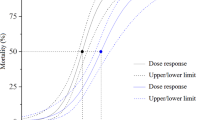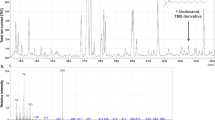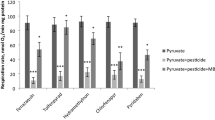Abstract
CYANIDE toxicity is closely associated with respiratory inhibition and, in many forms of life, death is attributed to disruption of oxidative metabolism through inhibition of the enzyme cytochrome oxidase. In insects also, cyanide inhibits the terminal oxidase, and it has been shown that in the insect heart cyanide sensitivity is closely associated with aerobic metabolism1.
This is a preview of subscription content, access via your institution
Access options
Subscribe to this journal
Receive 51 print issues and online access
$199.00 per year
only $3.90 per issue
Buy this article
- Purchase on Springer Link
- Instant access to full article PDF
Prices may be subject to local taxes which are calculated during checkout
Similar content being viewed by others
References
Harvey, W. R., and Williams, C. M., Biol. Bull., 114, 23 (1958).
Paulet, G., Arch. intern. physiol. et biochim., 63, 340 (1955). Merker, H., Lockner, W., and Gerstenberg, E., Arch. Exp. Pathol. and Pharmacol., 232, 459 (1957).
Author information
Authors and Affiliations
Rights and permissions
About this article
Cite this article
BOND, E. Effect of Oxygen on Cyanide Poisoning in Insects. Nature 193, 1002–1003 (1962). https://doi.org/10.1038/1931002b0
Issue Date:
DOI: https://doi.org/10.1038/1931002b0
Comments
By submitting a comment you agree to abide by our Terms and Community Guidelines. If you find something abusive or that does not comply with our terms or guidelines please flag it as inappropriate.



